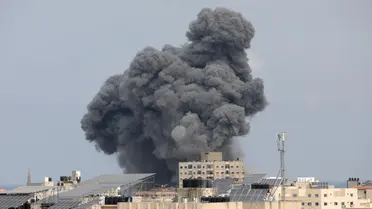The war on Gaza: A profound defeat
While Israel views the events of October 7 as a security and intelligence failure (which it indeed is), it fundamentally represents a political failure stemming from arrogance and unfounded convictions that led to ignoring the suffering endured by the besieged people of Gaza.
This ideology thrives on occupation, murder, devastation, and the displacement of an indigenous populace from their homeland to establish a state sustained by perpetuating these ideologies. While Israel views the events of October 7 as a security and intelligence failure (which it indeed is), it fundamentally represents a political failure stemming from arrogance and unfounded convictions that led to ignoring the suffering endured by the besieged people of Gaza. Israel perceived an opportunity in the relative calmness of the West Bank and the weakened state of the Palestinian Authority to further their agenda of Judaizing Palestine and its sacred sites. These delusions also led Israel to misconstrue Arab overtures for peace as a sign of waning interest in the primary regional cause: The Palestinian cause. It failed to acknowledge that peace, stability, and security in the region hinge upon resolving this just cause, even if it normalized relations with all Arab states. By dismissing both Arab and non-Arab peace initiatives and flouting international resolutions, Israel presumed its policies succeeded in shifting blame onto the victim, leveraging the support of their backers and allies that dominate the international media and decision-making spheres, particularly within Western nations led by the United States. Irrespective of the outcome of this brutal war, Israel cannot evade the repercussions of its prolonged occupation, its arrogance, and its reckless policies against the Palestinian people and their sacred sites.

The Palestinian Authority, Hamas, and other Palestinian organizations shoulder a significant burden for their failure. They were unable to reconcile their differences and bridge the persistent divides among them, giving grounds for Israel and others to sideline, isolate, and weaken them. The rift between the Palestinian Authority and Hamas within Gaza and the West Bank proved detrimental to the integrity of their cause.
Gaza is paying a grave price in destruction and bloodshed – a responsibility they share for their inability to match the magnitude of their cause. Today, they must heed the lessons from their suffering and the global sympathy they have garnered to present a unified voice to the world. This failure among the Palestinians also cascades into Arab failures, as the Arab world failed to galvanize unity among Palestinian forces and left Gaza besieged. By failing to back our quest for peace, it incites international and regional powers to do likewise.
The war on Gaza has laid bare the glaring hypocrisy and double standards among the elites and Western nations, particularly the United States. They have long propagated an image of advancing civilization and a commitment to moral, humanitarian, and legal principles, as well as global peace. This revelation is not new to our region and it is increasingly becoming apparent to their own people who once believed in these proclaimed values. Their failure is evident in their positions within the Security Council and the UN General Assembly, overtly supporting the war, and their proposals for resolving the conflict are an embodiment of this significant failure. As long as the United States policy towards the Palestinian cause reflects that led by Israel, driven by evil extremists intent on perpetuating massacres and destruction, this failure will persist. The recent failure of the United States culminates forty years of mismanagement in seeking a resolution. Its stance has merely echoed Israel’s, delaying peace efforts and stalling in order to establish an irreversible status quo that hinders a just and acceptable resolution for a Palestinian state or self-determination rights.

Despite vocal support for a two-state solution, the United States has not exerted sufficient pressure to move Israel to make it a reality. This war highlights Israel’s reliance on the United States as its advocate and guardian, seemingly dictating the latter’s policies to serve its agenda. Thus, the complete responsibility to bring peace to the region and resolve this prolonged conflict that jeopardizes security and stability lies with the United States. The close bond between the United States and Israel has eroded the former’s credibility as a mediator in this cause.
All proposed political solutions aimed at resolving the current impasse in Gaza, particularly those advocated by Western nations, seem to prioritize equations favoring the occupier’s demands while disregarding the plight and needs of the victims. These solutions aim to reinstate the Gaza Strip to its pre-October 7 status, which triggered the events of that day. The besieged people of Gaza felt they had nothing to lose and attempted to break free from their confinement in an open-air prison, albeit at a high cost. These solutions mainly address the burden of ‘post-war reconstruction’ by placing it on those not responsible for the destruction, rather than on the actual perpetrator and its allies.
To navigate this impasse and its impractical solutions, the first step could involve an Arab-led effort to introduce a new UN resolution that enforces an immediate ceasefire and establishes a prolonged truce lasting at least five years, backed by Arab assurances for the Palestinian faction and international guarantees to prevent aggression from the Israeli side. The culmination of this ceasefire would see the establishment of a Palestinian state, adhering to international resolutions, specifically UN General Assembly Resolution 181 of 1948, and UN Security Council Resolutions 242 and 338. Subsequently, earnest negotiations could commence for a definitive resolution to the Palestinian issue, guided by the Arab Quartet and the Arab Peace Initiative, aligning with UN resolutions.

To fully commit, Hamas must endorse the Palestine Liberation Organization (PLO) Charter, align with its political stances, and join its ranks. Additionally, a consensus must be reached for a temporary Palestinian political leadership for the Strip to oversee all matters until general Palestinian elections take place. These elections will bring forth fresh leadership to the Palestinian Authority, with participation from all PLO factions.
Simultaneously, there should be a complete withdrawal of Israeli forces from the Strip, an exchange of captives, the lifting of the siege, and the establishment of an international fund for supervised reconstruction. Funding will come from Israel, its Western allies, and other supportive nations. To ensure the success of this new peace initiative, it is imperative to prohibit all current leaders from Hamas, the Palestinian Authority, and Israel from holding any future political positions.



